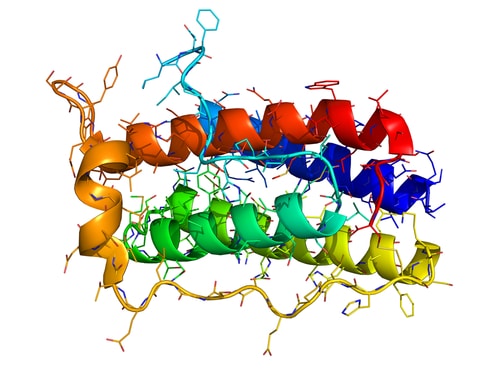
Hormones and Communication
Our genes and chromosomes determine many things about our bodies, but it’s through hormonal mechanisms that our cells know what to do. Arguably, you could say that the quality of the communication taking place between your hormones and individual cells is what determines health and, to a large extent, quality of life.
Leptin is a very influential hormone that has changed the way that those in the scientific community view the problem of obesity, as well as nutrition in general. Before the discovery of leptin, researchers looked at fat cells as nothing more than storage units. But with further studies, it has been determined that fat cells act more like endocrine organs, producing a number of important hormones including leptin. Like other endocrine organs such as the pancreas or pituitary gland, fat cells have a profound effect on many parts of the body including the brain.
The Ob Mouse
There is a strain of mouse – the ob mouse – that scientists often use in obesity research because it has a genetic mutation that causes it to be chronically obese. Though scientists studied the creature as a model for obesity, they didn’t really know why it was predisposed to becoming obese. In 1994, Jeffrey Friedman found the answer.
Friedman’s groundbreaking research led to the discovery of a powerful hormone – leptin. This hormone sends a signal to the biological system telling it that it is full and to stop eating. He also discovered that the ob mouse did not produce leptin. Interestingly, when the mice were injected with leptin, they lost weight and became healthier. Needless to say, pharmaceutical companies scrambled to produce the first marketable product. However, upon human testing, it was discovered that people didn’t have the same problem as ob mice. Obese people did, in fact, produce leptin sometimes in very large amounts. The problem with humans is that they were leptin resistant.
Leptin Resistance
Friedman and his colleagues identified leptin as a key hormone that works with the hypothalamus region of the brain to determine hunger and satiety levels. Leptin also determines how carbohydrates and fats are utilized and stored in the body, as well as when to start burning excess fat that may have accumulated.
Leptin resistance is conceptually the same way as insulin resistance. Too much fat causes the production of too much leptin which leads to chronically high levels. Over time, the hypothalamus and other biological constituents become less sensitive to the message that leptin sending. To put it another way, if your hypothalamus does not “hear” the leptin signal, you will not get full and will constantly overeat. Obviously, the result is obesity. But leptin resistance also makes dieting or any type of food restriction nearly impossible.
Treating Leptin Resistance
It’s important for those trying to lose weight to understand that leptin resistance is a progressive condition. The more leptin resistant you are, the more leptin resistant you will become. Here are a few things you can do to get your leptin signaling back on track:
• Avoid dense foods. Densely caloric foods such as cheesecake, pizza, or anything fried tend to elevate leptin levels.
• Avoid sugar. Eating high-sugar foods will only lead to more sugar cravings. Aside from the obvious cookies and candy bars, high-sugar foods also include bread, pasta, and rice because these food contain simple carbohydrates that turn to sugar almost instantaneously. A high-sugar diet will lead not only to leptin resistance but insulin resistance as well.
• Eat whole foods. The recommendation for somebody that is severely leptin resistant is to try to eat nine servings of mainly vegetables like broccoli, spinach, and kale each day. If you are still hungry, supplement with blueberries and citrus fruit. Slowly incorporate fish, beans, and small amounts of healthy fats such as avocados and nuts.
Knowing what is happening in your body is the first step to correcting any hormonal malfunctions that may be preventing you from losing weight. When proper leptin signaling is restored, you will see the difference in your appetite and the way you store and burn fat because your brain will finally be getting the correct message.
Related Articles By Cathe:
How Too Little Sleep Affects Appetite Hormones?
Is Leptin Resistance Fueling Your Food Cravings?
What Is Leptin Resistance and How Does It Affect Your Ability to Lose Weight?
Leptin: How This Appetite Hormone Affects Your Appetite and Your Weight

